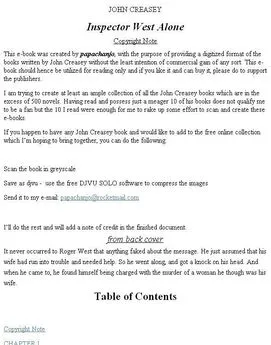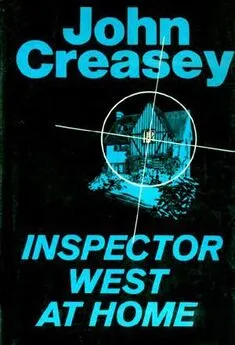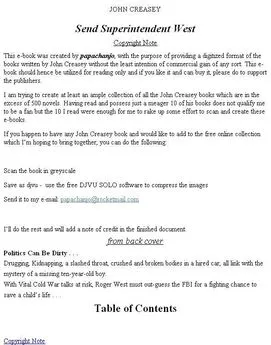John Creasey - Inspector West Alone
- Название:Inspector West Alone
- Автор:
- Жанр:
- Издательство:неизвестно
- Год:неизвестен
- ISBN:нет данных
- Рейтинг:
- Избранное:Добавить в избранное
-
Отзывы:
-
Ваша оценка:
John Creasey - Inspector West Alone краткое содержание
Inspector West Alone - читать онлайн бесплатно полную версию (весь текст целиком)
Интервал:
Закладка:
He was thinking almost as if he were at his office. He turned the pages, and again found what he wanted— another reference to himself, this time with a small photograph; and a poor one.
YARD MAN STILL MISSING
Chief Inspector West (photo side) still missing from the Yard and from his home in Bell Street, Chelsea. There has been no trace of his movements since he left the Yard late on Monday afternoon to keep an appointment with his wife. The police theory that he is suffering from loss of memory is supported by his wife, who says that the pressure of work for the past few years has affected his health.
Nonsense! Janet knew better. Janet had been visited by the pundits, had been told what to say to the Press—and the pundits were still influencing the Press. There was not a hint that he was even remotely connected with the Copse Cottage murder. Janet, by now, would be in agony of mind.
* * * *
So mystery was piled upon mystery. The dead girl was unknown, which meant that the Yard wasn’t getting far in its inquiries. That was trivial, compared with the greater mystery—what did these people think they were going to do with him? Why had they brought him here, why had they identified him with Arthur King, and then talked so plainly during the rescue that the police must realize that he was in fact West? Why had they treated him like this, as if trying to convince him that he was ill, in need of treatment—that his mind was unbalanced ?
What good was he to anyone if the Yard had reason to believe him to be a killer? He lit another cigarette.
He stood up and went to the window, looking into the garden, and then saw that this window was exactly the same as the one upstairs—of toughened glass, and without a movable frame.
He turned from the window and picked up the newspapers again—and then he heard a sound behind him. It made him swing round. A shutter was falling over the window from the outside, a shutter like a Venetian blind, blotting out the sun from the top half of the window, then descending over the bottom half. When the shutter was nearly down he rushed to the window and touched the glass, but there was nothing he could do. All he could see was a little of the lawn and the heads of a few daffodils; they disappeared when the shutter fell right into position, and he was left in absolute darkness. Only the glowing tip of his cigarette relieved it, and that faded when he stopped drawing at it.
He heard no sound, now—just stood with his back to the window, staring into darkness.
He heard a whirring noise, which came suddenly, and turned his head to the right. Then he saw light—a beam, as from a powerful torch, shining on the opposite wall. There, the wall was bare. The light hit the wall, much like that from a cine-camera and about the same shape; it made an oblong of light, two yards across, a yard and a half down. Yes, it was from a small projector, and the whirring was explained, they were going to put on a film. He forced himself to walk slowly to a chair facing the wall: he could just pick it out, among the other furniture. He sat down and crossed his legs.
A picture appeared.
A girl was walking along a narrow street—that was all. He didn’t recognize the street, but there were things in it which told him that it wasn’t in England; more likely, France. The terraced houses were tall, and the windows had shutters fastened back against the walls. There were several little balconies at the higher windows. The street was empty, except for the girl, who appeared to be walking towards him. She looked tall. She walked quickly. She was smartly dressed and seemed thoughtful. In a way, she wasn’t unlike Marion; but he might also say that she wasn’t unlike Janet. She kept on walking—was the street as long as that, or was it a trick of the camera ?
She turned into another street where there were more people, into yet a third. This was a wide busy thorough-fare. He caught a glimpse of a single-decker bus with a crowd of people standing on the platform at the back— peculiar to Paris.
The dead girl had worn French nylons.
He had forgotten that sharp nervous fear of the sudden darkness, was absorbed in the pictures.
The girl was lost among the crowds; no, not quite lost, she appeared occasionally, once stood and looked into a shop window—at handbags. Then she walked on—and there was a cut in the film.
Another picture came, this time of a small cafe, with a big striped awning over a dozen or so small tables, a waiter standing in white jacket by the open door, one couple drinking out of long glasses. Then the girl appeared and sat down as far as she could get from the couple. The waiter approached her; she shook her head, said something, indicated that she was waiting for a companion. The waiter took up his position in the doorway. The girl lit a cigarette, adjusted her long skirt, looked up and down the street. Twice she glanced at her wrist-watch. She began to frown.
She opened her handbag, and took something out—a letter? She studied it closely. Yet her eyes didn’t move from side to side, as they would have done had she been reading. She put the thing down, and he saw that it was a photograph; he thought it was of a man, but couldn’t be sure. The girl finished her cigarette, and began to tap her foot on the ground.
Then a shadow appeared over her.
She glanced up—and although the frown disappeared, she didn’t smile, but looked anxious. She said something, and Roger wished this weren’t a silent film, then scoffed at himself for the inanity of the thought.
The shadow grew into a man, who had his back to the camera. He pulled up a chair and sat down. The waiter reappeared. The man with the girl leaned forward and hid most of her from Roger. The man was hatless; he had fair wavy hair which needed cutting. There was something familiar about him; Roger couldn’t place it. Then the man turned, as the waiter approached, and Roger caught a glimpse of the profile—and sat up, a chill shiver running up and down his spine, a physical thing which he couldn’t prevent.
It was his profile.
He had never seen that girl in his life before, but he was sitting there as if in the flesh and talking to her.
The picture faded.
But the whirring continued, it hadn’t finished yet. The light seemed bright. The sweat on Roger’s forehead was cold; this was getting on his nerves, he could sense unnamed terrors hidden from him.
Another picture flashed on-
Of the girl—without a face, or with a face that was unrecognizable. She was just as he had seen her at Copse Cottage.
And then a man spoke from a corner of the room.
“Why did you do it, West? Why? ”
CHAPTER VIII
CONVERSATION
ROGER hadn’t heard him come in; hadn’t dreamt that anyone was there. He started violently, and peered towards the corner. He could see a vague shape, which faded as the light from the projector died away.
“Why did you do it, West? Why? ”
There was nothing sinister about the voice; it was just a man’s, earnest, rather grim. He’d heard it before, in the car driving down the hill near Helsham.
The man moved; Roger heard the sound, but it was too dark to see anything.
“Why don’t you tell me? Why did you do it?”
The man moved again.
Light came on, not bright, just a single wall-lamp near the door; everything in this affair seemed to be played out in semi-darkness. The man was little more than a shape, but his eyes were like silver fire.
“Why did you do it?”
“I don’t get this. I didn’t do it.” The denial sounded weak, even to Roger; he wasn’t really on top of himself.
“Who do you think will believe you?” the man demanded.
“Anyone with sense.”
“Anyone who sees that film, and knows the rest, will believe that you killed her, West.”
Roger turned and sat down. The cigarette-box was on its side, and the cigarettes were spread over the table. He took one and lit it; it was a relief to smoke. The man stood staring at him.
“What do you want?” Roger asked, heavily.
“I want you to get some facts straight. Don’t you remember going to Paris? Don’t you remember going to the cottage?”
“I haven’t been to Paris for over a year.”
“You could have seen her then.”
“I didn’t see her. I’ve never seen her before.”
The man drew nearer.
“West, you don’t seem to realize your position. You went to Paris and saw that girl—the camera doesn’t lie, the film is here, a copy of it can be sent to Scotland Yard. You went to Copse Cottage, you were alone there when the girl was killed. You appeared to be someone other than yourself—to fool the police. You were rescued by friends, who nearly killed a police-constable. Your colleagues at the Yard think you killed the girl. The evidence is so strong. That film, proving that you knew her before and had an affaire with her, gives you a motive. You met her by assignation in a lonely country cottage. You arranged that someone should telephone the Yard with a faked message, pretending to come from your wife, but you didn’t realize that your wife would deny having sent such a message. You thought you’d get safely home and no one would suspect you, didn’t you? But you didn’t have the
Roger said: “One of us is crazy.”
“No one at Scotland Yard would believe that you’re crazy. You’re too well known, too clever. This has all the hall-marks of a crafty crime—the kind of crime that a man who knows the law might commit. You’re a policeman.” The voice maintained its monotonous level, there was no sneer, no hint of a gloating smile, it was just factual. “You know how the police build up their cases, you’ve often collected the evidence to send a man to the gallows. You’ve briefed the prosecuting counsel a hundred times. Imagine him being briefed with all this evidence! That you once went to Paris; that this girl is French; that you saw her there; that she came to England and threatened to break up your home life; that you planned to meet her and to kill her, to save your domestic life from collapse. Don’t just tell me that you didn’t do it. West, tell me what you think a prosecuting counsel would make of it.”
Roger said: “In every trial, there’s a defending counsel, too.”
“I’ll leave you to think it over,” said the man abruptly. He put his hand to his pocket, pulled out an envelope and tossed it into Roger’s lap. He turned towards the door, and as he went out of the room the shutter began to fold up, and sunlight came in through the window again.
Roger fingered the large envelope, which seemed to have several folded papers inside. He groped for another cigarette. His hand was unsteady when he took the contents from the envelope. There were three smaller envelopes, each of them stamped with a French stamp; each with a Paris postmark, each with a blue sticker reading Par Avion , each addressed to Arthur King, at 18 Sedgley Road, Kingston-on-Thames. The writing was large and feminine, the ink bright blue. He took out the first letter, and the words which flew up at him were: “ My darling Arthur— ”
The writing was the same as on the envelope. The address was simply: Paris, with the date. He scanned the first. It was a love letter, as from a woman pouring out her heart. It was a good letter, written in fair English with a few odd turns of phrase, and an occasional word or expression in French; the signature was “Lucille.” There was a postcript: “ Soon, I must see you, when can you come? ”
He opened the second letter, dated two weeks afterwards, and the first words were the same, and then it went on with a fierce directness which shook him badly . “ I am coming to see you. Yes! I am able to come to London, very soon. I am delirious with the delight of it. Cheri . . . ”
Читать дальшеИнтервал:
Закладка:










